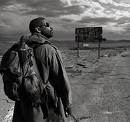
You have never experienced the concept of “hurry up and wait” until you’ve been hired by the federal government to write and produce an educational script on parenting.
May 2007, I was brought on board by my friend and director Paul Grant (Tangy’s Song) to write a short script that would be developed into an educational video promoting the concept of “anticipatory parenting within the mother/daughter dynamic.” A mouthful indeed, and according to the feds - an issue that needed to be addressed. The media company overseeing the project wanted a writer that could develop a serviceable script and had experience with the population that was to be the subject of the video. According to Paul, I fit the bill perfectly. I had a masters in social work (with a lot of experience working with girls and their families) and I had just been accepted to a prestigious Los Angeles- based screenwriting fellowship. So basically, a match made in heaven. And to top it all off, the agency that was paying for the project had run several focus groups, made up of the identified population of mothers and daughters, and as a result generated a meaty report that I could use to build a story and cherry-pick dialogue from. Easy as pie, right?
The senior manager and her staff from the media company were crazy cool. They provided clear directions around what needed to show up in the script (five scenarios highlighting problem behaviors and solutions) and then left me the hell alone to write. Over the course of two days I churned out a 14-page script. Afterward, Paul and I met with the senior media manager and her team over coffee and tweaked it. It was then passed off to the agency that commissioned the script and everyone went back to their regular programming.

About a month later I was notified that we would be meeting with the agency to receive notes and feedback. At this point I had been in a couple script note meetings, while working on a short with BET, so I was not overly concerned. That was until I found myself sitting at a large conference table surrounded by folks that didn’t seem too happy with my handy work. Based on the feedback I was getting you would have thought I had turned in the first draft of “Precious: Based on the Novel Push by Sapphire.” Paul and I kept looking at each other like WTF? They had issues with the “language”: a character said “hell”. They had issues with the “dialect”: a character dropped a couple “gs.” They had issues with the “violence”: the mother grabbed her daughter by the arm. Finally I couldn’t take it any longer, and with a sweet smile, I asked, “Have you guys read the focus group report?” They nodded yes. Then they knew that the mothers were using harsher language than “hell” and in their world jacking up your kid was as natural as breathing. As I understood it, my job was to show both the inappropriate and appropriate techniques regarding parenting and that focus group report was just bursting with inappropriate. So as far as I was concerned: mission accomplished. But by the end of the two hour meeting, my marching orders were clear: water down my coarse, illiterate and heinously violent opus.
I turned in the revised draft the day before I left for my fellowship (where I would be told I was a frickin’ genius and needed to move to L.A. immediately). Every few months I would check in with Paul regarding the project, but it seemed it was stuck in some sort of special project purgatory. A couple times during 2008, I was asked to rewrite various sections of the script, but basically there was no indication that it would ever make it into production. So eventually I stopped asking about it all together.

Fast-forward two years. I am now living in L.A. and planning a visit to the east coast to see family and friends. The day I land in DC, I get a call from Paul who laughs as he reports that the project has finally gotten the green light and he was entering into a four-day shoot during the exact week I’m home. We both laughed like hyenas and I promised that wild horses couldn’t keep me from coming by his set.
As I drove up on the little blue town house, tucked away in a suburban cul-de- sac, that was to serve as the family home, I suddenly remembered why I like being a screenwriter. No matter how frustrating or exhausting the process, there is no feeling like hearing actors breath life into the words that you had slaved over.
It was really fun spending an afternoon with Paul as he took our little script to the next level. The actors were great and his crew very skilled. Paul runs a very calm and respectful set so there is no drama to report. He did let me know that the original focus group mothers reviewed the “watered down” script and they thought the “inappropriate behaviors” were too weak and they would have done worse. I was vindicated!
I wish I could report that the DVD is now in circulation and being used by parenting groups across the land, but no such luck. The last word is that the rough cut is being “reviewed.” I guess back to purgatory it goes.
Check out my on set interview with Paul.

.jpg)





